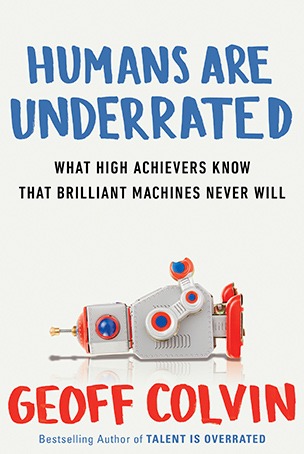Humans Are Underrated Summary

6 min read ⌚
 What High Achievers Know that Brilliant Machines Never Will
What High Achievers Know that Brilliant Machines Never Will
You know him as the author of the brilliant “Talent Is Overrated.” Now, Geoff Colvin is back with an update: In “Humans Are Underrated,” he explains how talent is not the only thing you can – and should – develop.
Because the machines are coming, and because, as perfect as they are, humans have an advantage in many fields. Learn who they are and how you can benefit.
Who Should Read “Humans Are Underrated”? And Why?
If you’ve read this article and found your job somewhere near the top of the least safe job list – you may be already in a panic. After all – how are you supposed to win against a machine?
Well, “Humans Are Underrated” is here to alleviate your anxiety. It explains what in which ways computers will one day surpass us and which ways they will never be able to.
In other words, even in the worst-case scenario, this book can teach you which skills you should focus on to become indispensable in the future job market.
About Geoff Colvin
Geoff Colvin is an American journalist, broadcaster, motivational speaker and senior editor-at-large for “Fortune.” He has written hundreds of articles for the magazine, including the very popular regular column “Value Driven.”
is an American journalist, broadcaster, motivational speaker and senior editor-at-large for “Fortune.” He has written hundreds of articles for the magazine, including the very popular regular column “Value Driven.”
A frequent TV show and radio guest, Colvin graduated summa cum laude from Harvard, receiving a B. A. in economics, before obtaining an M.B.A. from New York University’s Stern School.
He has authored four books so far: “Angel Customers & Demon Customers,” “The Upside of the Downturn,” “Talent Is Overrated” and “Humans Are Underrated.”
Read more at http://geoffcolvin.com.
“Humans Are Underrated PDF Summary”
Sure, you know that twenty years ago you had to wait about a minute for your dial-up to download a 200px image and that twenty years before only few hundred people on the planet even bothered to buy a computer.
Still – it’s almost impossible to imagine how fast computers increase their power!
American computer scientist, William Nelson Joy, has provided us with an excellent way to think about it.
You walk – he points out – at an average speed of 3 miles per hour. Usain Bolt’s speed has been clocked at about 30 mph. Finally, the fastest planes in the world can fly at a speed of about 3000 mph.
In other words, a plane is faster than the fastest man alive by a factor of 100 and is a thousand times faster than you walking from point A to point B.
Now, get this!
It systems increase their computing power by a factor of 100 every two years. Which amounts to a factor of 1,000,000 if we make the comparison over a four-decade-long period!
Translated back into our analogy, this means that, by now, if the plane industry developed similarly, we should have already developed a plane able to fly around the Earth in no more than two seconds!
We just can’t get our heads around the numbers, exclaims Geoff Calvin!
But they are the real numbers, and, interestingly enough, they were accurately predicted as early as 1965 by Gordon Moore.
Fortunately for humans, the trend can’t go on indefinitely (due to space limitations), but half a century since the original prediction, it still sounds more like a natural law than a projection.
But, why did we say “fortunately for humans”? After all, you’re reading this because of the accuracy of Moore’s law.
Well, because computers are developing so fast that unless homo sapiens evolve into homo deus in few years, we stand no chance defeating them in almost any field whatsoever.
And if we can’t compete against computers in most areas, maybe, you’d think, we’d better hold on to that “almost” from the previous sentence.
Let’s find where we’re better at and where computers are inherently incapable of improving.
Hold your horses!
Computers are now able to write poems, beat Kasparov in chess, and even accurately read human emotions!
Emotions! The first thing you’d say if asked what is the thing which distinguishes computers and humans most!
Elon Musk may be right: the Dooms Day is near!
No – says Geoff Calvin. It’s just a wrong way to posit the problem.
We shouldn’t ask ourselves what the computers can’t do, because they are developing so fast that what is true today may be false in less than a year.
Instead, we should ask ourselves what humans are most driven to do. Or, to put it differently, what we must do even if a computer can do it as well.
Geoff Calvin has discerned five categories where improving will not only make you a more valuable asset in the workplace of the future but will also help you remain human in an increasingly inhuman world.
First of all, empathy, the foundation of all else. It consists of two elements: understanding the feelings of the other and reacting in an appropriate manner. It’s what we crave for – it’s what computers will never be able to imitate.
Because even if a computer is capable of doing everything right, it will not convince us that he feels for us. Because, after all, there’s no pleasure in winning a game if you know that the others let you win it.
Next, teamwork. It’s, once again, something that computers may be programmed to do; but, also something that, really, makes no sense if you don’t put the effort.
And when we do, we create something spectacular: a cohesive group capable of winning even against a less unified team of far more skilled individuals.
Thirdly, storytelling. The foundation of Rolf Jensen’s dream society.
Why?
Because we are born with an inherent need to tell stories. And because, even when it is not true, we like a good story much better than logic and facts.
Let’s just let computers rule the latter. We’ll deal with the former.
Fourthly, creativity.
True, computers can be creative. But humans are better at randomness and serendipity. And that’s the basis of creativity.
Finally, relationships.
No need for further explanation, we suppose. This one’s the difference between animals and humans, between humans and humanity.
Key Lessons from “Humans Are Underrated”
1. Computing Power Increases at Incredible Rates
2. Don’t Ask What Computers Can’t Do…
3. …Ask What We Must Do Even If Computers Do It Too
Computing Power Increases at Incredible Rates
About half a century ago, Gordon Moore, the co-founder of Intel, published a paper which stated that the number of components per integrated circuit is doubled every two years. And it predicted that this trend will continue in the future.
It has. And it has resulted in today’s computers being 1,000,000 times faster and more efficient than those from forty years ago!
Don’t bother trying to grasp what that actually means. Let’s just say that it’s a lot.
Don’t Ask What Computers Can’t Do…
Consequently, asking what computers can’t do is the wrong way to look at things.
They develop so fast that even if they are incapable of doing something today, they may be able of doing it perfectly in no more than few years.
As Randall Munroe’s webcomic xkcd has shown to us a couple of times before, this is something that has been proven over and over again.
…Ask What We Must Do Even If Computers Do It Too
Now, if you start with the premise that computers will one day be able of doing everything, it’s a lot easier to detect what you should start doing now to not be made obsolete by computers in the future.
And the answer is relatively simple: the things you must do as a human, even if computers one day learn to do them as well.
Empathy is the foremost example. No matter how good computers are at empathizing, their empathy will always be programmed and, thus, fake.
The good news?
The same holds true for four other human qualities: teamwork, storytelling, creativity, and relationships.
Like this summary? We’d like to invite you to download our free 12 min app, for more amazing summaries and audiobooks.
Humans Are Underrated Quotes
As the shift in valuable skills continues, organizations are finding not only that they have no jobs for the disengaged and socially inept, but that such people are toxic to the enterprise and must be removed. Share on X Google’s autonomous cars are an obvious and significant example—significant because the number one job among American men is truck driver. Share on X As technology takes over more of our work… the people who master the human abilities that are fading all around us will be the most valuable people in our world. Share on X Computing power increases by a factor of a million in forty years. The computing visionary Bill Joy likes to point out that jet travel is faster than walking by a factor of one hundred, and it changed the world. Share on X The right kind of narrative, told by a person, is mightier than logic. Share on XOur Critical Review
“Humans Are Underrated” is a fresh and original take on something many people have grappled with: how to deal with the advent of AI?
His response is almost counter-intuitive. Unlike other writers on the subject, Geoff Colvin doesn’t really care what computers are incapable of doing; he cares what humans must do even if computers develop so much that they are able to do it too.
Well-researched and superbly written, “Humans Are Underrated” is both a thought-provoking and highly practical book.








